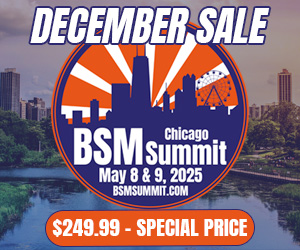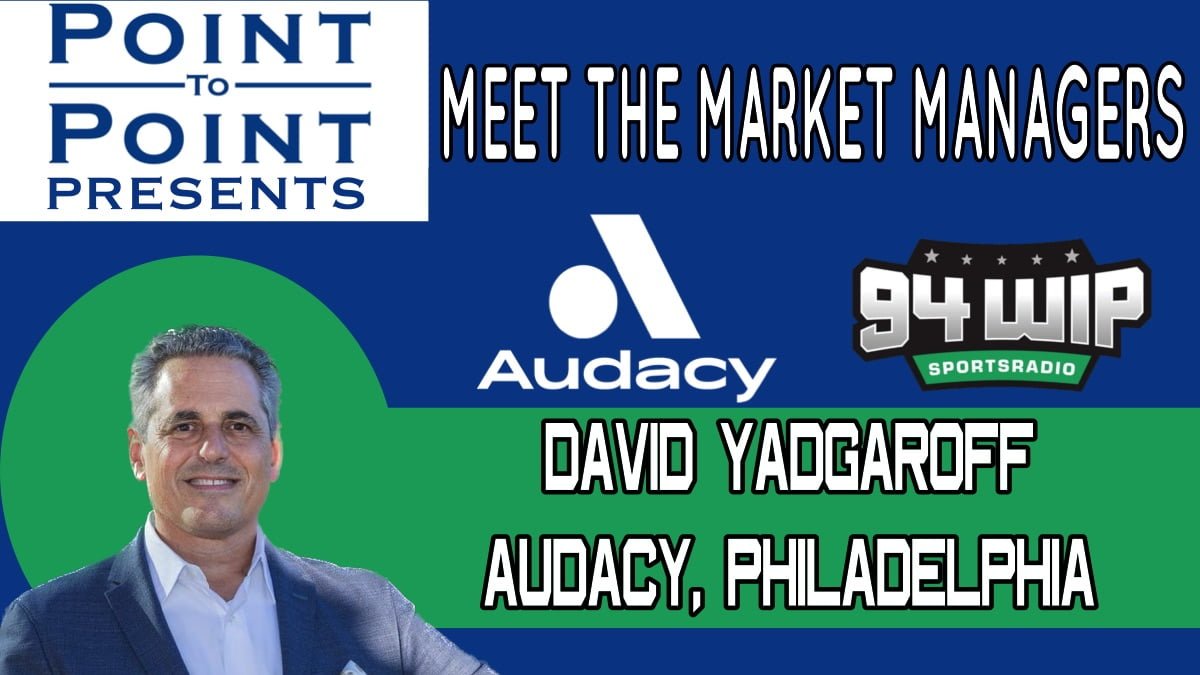David Yadgaroff doesn’t talk just to hear himself speak. He gets to the point and he does it quickly, whether he is telling you what he is thinking or he is answering your questions. That fact is evidenced by the length of this week’s entry to the Meet the Market Managers series presented by Point-to-Point Marketing.
It has been a wild ride for WIP over the last 18 months. Yadgaroff had to find a new PD, figure out the best way to send off the station’s iconic morning host, and launch new shows in two different day parts. In the middle of it all were World Series and Super Bowl runs to deal with, too.
Yadgaroff discusses all of it. He also makes time to weigh in on how he addresses Audacy’s stock issues with his staff, the climate of political advertising, and the best practices he has found for making sure advertisers are making the most of digital products.
Demetri Ravanos: Tell me about life since Angelo Cataldi retired. What has changed in terms of the atmosphere in the building?
David Yadgaroff: It’s a great question. It’s hard to replace somebody as iconic as Angelo, who really lived and breathed his role, setting the agenda for the Philadelphia sports fan. But we’re really proud of what Joe (DeCamara), Jon (Ritchie), James (Seltzer), and Rhea (Hughes) have done in the morning to deliver a show that’s fresh and new, but also lives up to the expectation that Angelo set.
The addition of Hugh Douglas to midday with Joe Giglio has been very fun, too, because Hugh is a great character and teammate, and fun around the office, as well as very compelling and entertaining radio.
DR: So I do want to circle back on Jon and Joe here in just a second, but I do wonder, because Angelo had sort of made some hints before he officially announced his retirement. At the time you were looking for a new program director, was his decision about when to call that a career something that ever came up as you were searching for Spike’s successor? Is it something candidates wanted to know about?
DY: Yeah, absolutely. Angelo was a great partner and expressed his interest in retiring. At that time, Spike had got promoted to New York, so we discussed the radio station as a whole. Angelo, obviously his brand was so closely tied to ours and ours so closely tied to his, he said that he’d do whatever we needed at the radio station to make the transition smooth. That is how we ended up with that last year where Angelo took Wednesdays off to give him a little bit of rest and peace as he finished out his agreement. Then, obviously, he wanted to remain on until the Eagles’ season finally ended, so we had the gift of having Angelo with us until February.
DR: Let’s circle back on Joe and Jon. They are obviously known commodities to WIP’s advertisers. The job of getting that particular population on board with those guys moving into mornings, it’s very different than getting listeners on board, right? So many of your advertisers are going to be on in multiple dayparts, whereas the listeners may only come in on their drive to work or on their drive home from work. I would imagine on the business side, this was a pretty smooth transition.
DY: Very smooth. We retained the vast majority of the legacy morning show advertisers, as well as retaining the advertisers that came from middays to mornings. The fresh perspective and excitement about the radio station helped drive more sales as well.
You think about the last 12 months of the radio station, Angelo is talking about his farewell, we’re doing a lot of fun stunts about that time, the Phillies postseason, the Eagles postseason, the farewell event, and officially the beginning of a new show that already was a fan favorite. Really, we are very fortunate to have been at the forefront of the sports media narrative in Philadelphia for quite some time.
DR: The elephant in the room when it comes to Audacy right now is what’s going on with the company’s stock price. I know you cannot give me specific answers, but I do wonder, as somebody that is charged with leading a cluster, you have so many people that you are responsible for. Do you find yourself having conversations where you’re talking to someone that assumes you have more answers than you actually do right now?
DY: Let me give you the general vibe. We have a very robust business with six radio stations creating a lot of multi-platform content, selling a lot of advertising, and doing fun things. So for our staff on this side of the building, it’s business as usual. We’re having success in many metrics and marching right along.
DR: The thing I wonder about that’s different for you than other Audacy stations is you literally share a space with Audacy Corporate.
DY: I run a culture of transparency and when things happen that are newsworthy, I make sure to address them. When things aren’t newsworthy, I try to reinforce our core business here, which is one that is very profitable and healthy.
DR: So last year was extraordinary sports-wise in Philadelphia. Tell me a bit about the new opportunities that were created for WIP, whether we’re talking about interest from new potential clients or an influx of new listeners.
DY: So WIP has the benefit of being the voice of the fan for decades. We talk a lot about the Eagles. Fans want to talk Eagles 52 weeks a year, and when the Eagles perform, there’s such enthusiasm and excitement. So, yes, I think we pick up new listeners and I know we pick up new advertisers to be part of that fun.
The Phillies’ season sort of picked up suddenly at the end. It was a much more concentrated and exciting time that everybody just got into from an advertising standpoint, analyst standpoint, and fan standpoint. It was a lot of excitement in a very short period of time.
DR: Given how much Audacy has embraced digital products and where we are in terms of consumption these days, everybody is so used to on-demand content. Nobody works on a station or network’s timetable anymore. Have you found any advertisers that are more interested in the on-demand product than the traditional radio broadcast?
DY: I don’t think there’s a general statement that describes everyone’s appetite. We focus our salespeople on trying to sell multi-platform campaigns through re-marketing. We find that the more things advertisers are invested in, the more connected they are with our business and the more success they have. All of our salespeople are cross-trained. Ultimately, we try to focus on what an advertiser needs and then make successful recommendations for them. There’s a lot of attention on WIP, so obviously they’re doing a nice job of that.
DR: Let’s talk about that cross-training as it relates to the stations in the cluster. I recently read this piece that said we are already on pace to see political advertising for the 2024 election cycle surpass what we spent in 2020. Last year, you guys have these two contentious elections inside of Pennsylvania. When it comes to revenue generation, has the fracture between the two parties been relatively good for business in radio? I mean, do you find that people that candidates are advertising further and further out from election day now?
DY: I think there’s two folds to that question. One is the TV advertising environment gets so toxic and nasty with political ads. It forces out transactional advertisers. That gives us the opportunity to put those advertisers on the radio. So that’s one part. The second part of it is, yes, candidates for PACs are spending more and they’re spending more frequently.
DR: I would imagine that KYW and WPHT see most of those buys in your cluster, but what about WIP? How much are those PACs and candidates and those campaigns looking to a format to spread their message where maybe the listener is not engaged in the political conversation 24 hours a day?
DY: I think the first thought is that stations like KYW and PHT do the best, but it really depends on the campaign and the issue and what their strategy is. I mean, there are some issues and campaigns that come down that they can only want to buy. WBEB And WOGL because they are looking for a suburban mom. So it really depends. I think political advertisers are a lot more strategic than they were years ago where they just bought news and news talk.

Demetri Ravanos is a columnist and features writer for Barrett Media. He is also the creator of The Sports Podcast Festival, and a previous host on the Chewing Clock and Media Noise podcasts. He occasionally fills in on stations across the Carolinas in addition to hosting Panthers and College Football podcasts. His radio resume includes stops at WAVH and WZEW in Mobile, AL, WBPT in Birmingham, AL and WBBB, WPTK and WDNC in Raleigh, NC.
You can find him on Twitter @DemetriRavanos or reach him by email at DemetriTheGreek@gmail.com.








